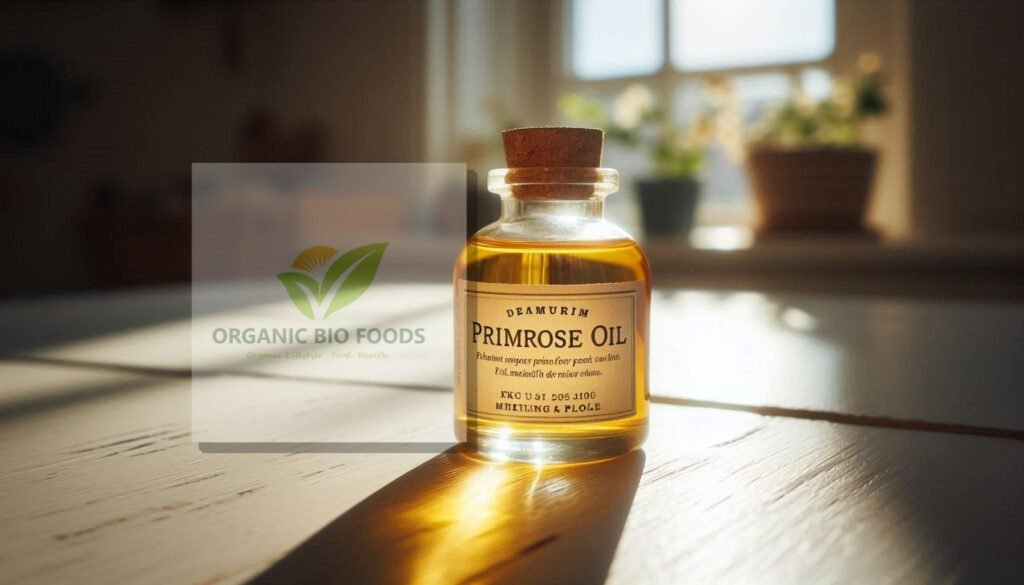Primrose oil, also known as evening primrose oil (EPO), is a popular natural supplement that has been used for centuries. Extracted from the seeds of the evening primrose plant (Oenothera biennis), it is rich in omega-6 fatty acids, particularly gamma-linolenic acid (GLA). GLA is believed to have many health benefits, which is why primrose oil is often recommended for issues like skin health, hormone balance, and inflammation.
In this post, we’ll dive into what primrose oil is, its nutritional makeup, and the specific health benefits it offers. Whether you’re curious about how it could support your overall wellness or have specific health concerns, this guide will give you a deeper understanding of primrose oil and how it can be a useful addition to your daily routine.
What Is Primrose Oil?
Primrose oil is derived from the seeds of the evening primrose plant, which blooms with yellow flowers in the evening—hence the name “evening primrose.” This plant is native to North America but is now grown in other parts of the world, including Europe and Asia. The oil is extracted from the seeds through cold pressing to preserve its valuable nutrients, especially gamma-linolenic acid (GLA), an essential fatty acid known for its anti-inflammatory properties.
Gamma-linolenic acid (GLA) is not typically found in large amounts in our diets, making primrose oil a valuable source of this fatty acid. GLA is a precursor to prostaglandins, compounds that help regulate the body’s immune response, inflammation, and hormonal balance. These functions make GLA a key player in many of the health benefits attributed to primrose oil.
Nutritional Profile of Primrose Oil
While primrose oil is mainly known for its GLA content, it also contains linoleic acid, another omega-6 fatty acid that supports cell function and overall health. Here’s a breakdown of the typical components of primrose oil:
- Gamma-Linolenic Acid (GLA): The main active ingredient, known for its anti-inflammatory and hormone-regulating properties.
- Linoleic Acid: Another type of omega-6 fatty acid that supports skin health and cell function.
- Vitamin E: Acts as an antioxidant, protecting cells from damage.
Because of its high content of healthy fats, primrose oil is commonly used in both supplement form and topically for skin benefits.
5 Health Benefits of Primrose Oil
1. Primrose Oil Supports Hormonal Balance
One of the most popular uses of primrose oil is for supporting hormonal balance, especially in women. Many women take primrose oil to help manage symptoms of premenstrual syndrome (PMS) and menopause. Research has shown that GLA can help reduce symptoms such as mood swings, bloating, and breast tenderness associated with PMS.
For women going through menopause, primrose oil may provide relief from hot flashes. A study published in the journal Menopause found that women who took evening primrose oil experienced a reduction in the severity of their hot flashes compared to those who took a placebo.
Primrose oil’s hormone-regulating effects are thought to come from its ability to influence prostaglandin production, which plays a key role in managing the menstrual cycle and hormonal balance.
2. Primrose Oil Improves Skin Health
Primrose oil is often recommended for people with skin issues like eczema, acne, and dryness. Thanks to its anti-inflammatory properties, GLA can help soothe inflamed skin and reduce irritation. For people with eczema, primrose oil may help improve skin barrier function, keeping moisture in and irritants out.
A study published in the International Journal of Cosmetic Science showed that taking evening primrose oil supplements for 12 weeks improved skin moisture, firmness, and elasticity in participants with dry or rough skin. The GLA in the oil helps by improving the structure and function of skin cells, making it particularly beneficial for those with skin conditions that involve dryness or irritation.
Additionally, some people use primrose oil topically as a natural treatment for acne. By reducing inflammation and promoting healthy skin, it may help minimize acne flare-ups and support clearer skin overall.
3. Primrose Oil Reduces Inflammation and Joint Pain
Chronic inflammation is a factor in many health conditions, from arthritis to heart disease. The anti-inflammatory properties of primrose oil can help reduce inflammation in the body, which is particularly beneficial for people dealing with joint pain, such as those with rheumatoid arthritis.
Several studies have shown that taking primrose oil supplements can improve symptoms of rheumatoid arthritis, including joint pain and stiffness. A study published in the journal Arthritis and Rheumatism found that participants who took primrose oil experienced a reduction in symptoms, likely due to the GLA’s anti-inflammatory effects.
If you suffer from joint pain or other inflammatory conditions, adding primrose oil to your routine may provide some relief.
4. Primrose Oil May Help with Fertility and Reproductive Health
While more research is needed in this area, some evidence suggests that primrose oil could help with fertility and reproductive health. GLA is believed to improve cervical mucus production, which is essential for sperm to swim through and reach the egg. Some women use primrose oil to support fertility by taking it during the first half of their menstrual cycle.
However, it’s important to consult with a healthcare professional before using primrose oil for fertility purposes, as its effects on pregnancy are not fully understood.
5. Primrose Oil Promotes Heart Health
Primrose oil may also support heart health by improving cholesterol levels and reducing blood pressure. GLA has been shown to lower “bad” LDL cholesterol while maintaining “good” HDL cholesterol, which can help protect against heart disease. Additionally, the anti-inflammatory effects of GLA may help prevent damage to the blood vessels, further supporting cardiovascular health.
A study published in the journal Prostaglandins, Leukotrienes, and Essential Fatty Acids found that participants who took GLA-rich supplements experienced improved cholesterol levels and reduced blood pressure, both of which are risk factors for heart disease.
While primrose oil is not a replacement for traditional heart medications, it may be a useful supplement for maintaining overall cardiovascular health.
Downsides and Considerations
While primrose oil offers several health benefits, there are some downsides and considerations to keep in mind before adding it to your routine.
1. Possible Side Effects Of Primrose Oil
For most people, primrose oil is safe to use in moderate amounts. However, some people may experience mild side effects, such as stomach upset, nausea, or headaches. If you have any concerns, start with a small dose and see how your body responds.
2. Interactions Of Primrose Oil with Medications
If you’re taking any medications, especially blood thinners or anticoagulants, talk to your doctor before using primrose oil. It can increase the risk of bleeding and may interfere with certain medications.
3. Primrose Oil May Not Suitable for Everyone
While primrose oil is generally considered safe, it may not be suitable for pregnant or breastfeeding women. Some studies suggest that it can increase the risk of complications during pregnancy, such as preterm labor. Always consult with a healthcare professional if you’re pregnant or nursing before taking any new supplements.
How to Use Primrose Oil
Primrose oil can be taken as a supplement in capsule form or applied topically to the skin. The typical dosage for supplements ranges from 500 to 1,000 mg per day, but it’s best to follow the dosage recommendations on the product label or consult with a healthcare professional.
When using primrose oil topically, you can apply it directly to areas of dry or irritated skin. Some people also mix it with their moisturizer or carrier oils for added skin benefits.
Conclusion: Is Primrose Oil Right for You?
Primrose oil offers several potential health benefits, from balancing hormones and improving skin health to reducing inflammation and supporting heart health. For many people, it can be a useful supplement to support overall wellness. However, it’s essential to be mindful of potential side effects and interactions with medications.
If you’re considering adding primrose oil to your health routine, it’s a good idea to consult with a healthcare professional, especially if you’re taking medications or have specific health conditions. With its wide range of benefits, primrose oil could be a valuable addition to your wellness toolkit, supporting everything from skin to heart health.
Sources:
- “Health Benefits of Evening Primrose Oil.” Healthline.
- “Evening Primrose Oil and Its Effect on Hormones.” WebMD.
- “Gamma-Linolenic Acid: What You Need to Know.” Medical News Today.
- “The Role of GLA in Inflammation and Joint Pain.” Arthritis Foundation.
- “Skin Benefits of Evening Primrose Oil.” International Journal of Cosmetic Science.








